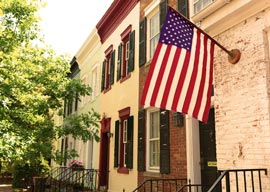
March 25, 2015

Georgetown, Washington D.C.
Source: Shutterstock
On a more fundamental level, there is something important about the notions of place and belonging that can be lost to the tides of ever-increasing migration. Conserving your home or your community is about more than economics. It’s about feeling a tangible connection to the past, and claiming a place in the future. As communitarian Wendell Berry wrote in his essay “Conservation and Local Economy,” “People are motivated to care for land to the extent that their interest in it is direct, dependable, and permanent.”
Dependability and permanence is hard to maintain. Things are transient, including our attention spans. We”re taught to value the moment; to endorse the present over the past or future. With that mindset, it makes sense to endorse the free flow of peoples to and from land, extracting all they can before transferring to the next suitable area. Where does all this leave us then? Controversial French novelist Michel Houellebecq argues in his latest book Soumission that without a sense of reverence for the past, we”re left isolated and susceptible to new influences that are not always favorable. Houellebecq uses a near-future France presided over by a Muslim Brotherhood president to make the point.
Allowing affordable housing in ritzy DC neighborhoods like Georgetown isn”t the equivalent of a foreign cultural invasion. Perhaps the construction of a few median-rent housing complexes wouldn”t take away from the high-class aura of Washington’s premier locale. The Christian in me sympathizes with those trying to escape the centripetal, downward spiral of impoverished culture. Even so, there is no universal right to plop down and set up shop wherever you feel is best.
Whoever said all politics is local was right. Even progressives will tell you to get off their lawn. And I don”t blame them one bit. Either you preserve the values closest to you or they become lost over time.